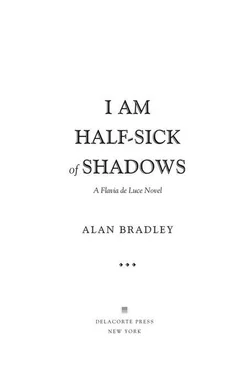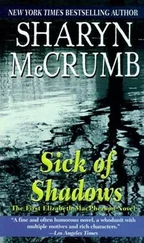Alan Bradley - I Am Half-Sick of Shadows
Здесь есть возможность читать онлайн «Alan Bradley - I Am Half-Sick of Shadows» весь текст электронной книги совершенно бесплатно (целиком полную версию без сокращений). В некоторых случаях можно слушать аудио, скачать через торрент в формате fb2 и присутствует краткое содержание. Жанр: Старинная литература, на английском языке. Описание произведения, (предисловие) а так же отзывы посетителей доступны на портале библиотеки ЛибКат.
- Название:I Am Half-Sick of Shadows
- Автор:
- Жанр:
- Год:неизвестен
- ISBN:нет данных
- Рейтинг книги:5 / 5. Голосов: 1
-
Избранное:Добавить в избранное
- Отзывы:
-
Ваша оценка:
- 100
- 1
- 2
- 3
- 4
- 5
I Am Half-Sick of Shadows: краткое содержание, описание и аннотация
Предлагаем к чтению аннотацию, описание, краткое содержание или предисловие (зависит от того, что написал сам автор книги «I Am Half-Sick of Shadows»). Если вы не нашли необходимую информацию о книге — напишите в комментариях, мы постараемся отыскать её.
I Am Half-Sick of Shadows — читать онлайн бесплатно полную книгу (весь текст) целиком
Ниже представлен текст книги, разбитый по страницам. Система сохранения места последней прочитанной страницы, позволяет с удобством читать онлайн бесплатно книгу «I Am Half-Sick of Shadows», без необходимости каждый раз заново искать на чём Вы остановились. Поставьте закладку, и сможете в любой момент перейти на страницу, на которой закончили чтение.
Интервал:
Закладка:
When I was finished, I found myself frozen there for a moment on the roof, thinking, motionless in the bitter wind, a lightning-struck weather vane that points forever in the wrong direction.
And then, just as quickly, my spirits were restored. Wasn’t I, after all, within hours of being able to write “Conclusion” to my grand experiment?
As I fought my way back across the snowy wastes, I whistled a few bars of “The Holly and the Ivy” in sly reference to the sticky mess I had just applied to the chimneys of Buckshaw. I even broke into song:
“The rising of the suh-hun and the running of the deer …”
It was time to turn my attention to the Rocket of Honor.
“What are you doing ?” Feely demanded, as I descended the last few steps into my laboratory.
Her fists were clenched and her eyes, as they always are when she’s angry, were several shades lighter than their normal blue.
“Who let you in?” I asked. “You’re not allowed in this room without written permission from me.”
“Oh, take your written permission and stick it up the flue.”
Feely could be remarkably coarse when she felt like it.
Still, “stick” and “flue” were uncannily descriptive of what I’d just done on the roof. I’d better be careful , I thought. Perhaps Feely, like Val Lampman, had found a way of peering into my mind.
“Father sent me to fetch you,” she said. “He wants everyone gathered in the foyer at once. He has something to say, and so does Val Lampman.”
She turned and strode off towards the door.
“Feely …” I said.
She stopped and, without looking at me, turned halfway round.
“Well?”
“Daff and I made a Christmas truce. I thought perhaps—”
“Truces expire after five minutes, come hell or high water, as you jolly well know. There’s no such thing as a Christmas truce. Don’t try to suck me into any of your sordid little schemes.”
I could feel my eyes swelling as if they were about to burst.
“Why do you hate me?” I asked suddenly. “Is it because I’m more like Harriet than you are?”
If the room had been cold before, it was now a glacial ice cave.
“Hate you, Flavia?” she said, her voice trembling. “Do you really believe I hate you? Oh, how I wish I did! It would make things so much easier.”
And with that she was gone.
“I’m sorry we’ve all of us been trapped, as it were,” Father was saying, “even though we’ve been trapped together.”
What the dickens did he mean? Was he apologizing for the weather?
“Despite their … ah … polar expedition, the vicar and Mrs. Richardson have done yeoman work in keeping the little ones entertained.”
Good lord! Was Father making a joke? It was unheard of!
Had the stress of the season and the arrival of the moviemakers finally cracked his brain? Had he forgotten that Phyllis Wyvern was lying—no, not lying, but sitting —dead upstairs?
His words were greeted with a polite rustle of laughter from the people of Bishop’s Lacey, who sat rumpled but attentive in their chairs. Clustered in one corner, the ciné crew whispered together uneasily, their faces like masks.
“I am assured,” Father was saying, with a glance at Mrs. Mullet, who stood beaming at the entrance of the kitchen passageway, “that we shall be able to muster up sufficient jam and fresh-baked bread to last until we are released from our … captivity.”
At the word “captivity” Dogger sprang to mind. Where was he?
I swiveled round and spotted him at once. He was standing well off to one side, his dark suit making him nearly invisible against the stained wood paneling. His eyes were black pits.
I squirmed in my chair, hunched and unhunched my shoulders as if to relieve stiffness, and standing up, stretched extravagantly. I sauntered casually over to the wall and leaned against it.
“Dogger,” I whispered excitedly, “they dressed her for dying.”
Dogger’s head turned slowly towards me, his eyes sweeping round the vast room, illuminating as they came until, as they reached mine, they were as the beam of a lighthouse fixed on a rock in the sea.
“I believe you’re right, Miss Flavia,” he said.
With Dogger, there was no need to prattle on. The look that went between us was beyond words. We were riding the same train of thought and—aside from the unfortunate death of Phyllis Wyvern, of course—all was well with the world.
Dogger had obviously noticed, as I had, that—
But there was no time to think. I had missed Father’s concluding remarks. Val Lampman had now taken the spotlight, a tragic figure who was hanging on to a lighting fixture, with the most awful white knuckles, as if to keep from crumbling to the floor.
“… this terrible event,” he was saying in an unsteady voice. “It would be unthinkable to go on without Miss Wyvern, and I have therefore, reluctantly, made the decision to shut down production at once and return to London as soon as we are able.”
A collective sigh went up from the corner in which the ciné crew was gathered, and I saw Marion Trodd lean forward and whisper something to Bun Keats.
“Because we are unable to communicate with the studio,” Val Lampman went on, putting two fingers to his temple as if receiving a message from the planet Mars, “I’m sure you will appreciate that this decision must needs be mine alone. I’ll see that specific instructions are handed out in the morning. In the meantime, ladies and gentlemen, I suggest that we spend whatever is left of this rather sad Christmas Eve remembering Miss Wyvern, and what she has meant to each and every one of us.”
It was not Phyllis Wyvern I thought of, though, but Feely. With filming shut down, her chance of stardom was over.
Ages from now—sometime in the misty future—historians sifting through the vaults of Ilium Films would come across a spool of film with images of a letter being placed carefully, again and again, upon a tabletop. What would they make of it? I wondered.
It was pleasant, in a complicated way, to think that those out-of-focus hands, with their long perfect fingers, would be those of my sister. Feely would be all that remained of The Cry of the Raven , the film that died before it was born.
I came back to reality with a start.
Father was summoning Dogger with a single raised eyebrow, and I took the opportunity to escape up the stairs.
I had much to do and there was little time left.
And yet there was. When I got to my bedroom, I saw that it was not yet eleven o’clock.
I had always been told by Mrs. Mullet that Father Christmas did not come either until after midnight, or until everyone in the household was asleep—I’ve forgotten the exact formula. One way or another, it was far too early to check my traps: With half the population of Bishop’s Lacey wandering about at large in the house, the old gentleman would hardly risk coming down the drawing room chimney.
And then this thought came to mind. How could Father Christmas climb down—and back up—so many million chimneys without getting his costume dirty? Why had there never been, on Christmas morning, a filthy black trail on the carpet?
I knew perfectly well from my own experiments that the carbonic products of combustion were messy enough even in the small quantities in which they were encountered in the laboratory, but to think of a full-grown man descending a chimney encrusted with decades of soot while wearing an outfit that was little better than an oversized pipe cleaner was beyond belief. Why hadn’t I thought of this before? Why had such an obviously scientific proof never occurred to me?
Unless there was some invisible elf who followed Father Christmas around with a broom and a dustpan—or a supernatural hoover—things were looking grim indeed.
Читать дальшеИнтервал:
Закладка:
Похожие книги на «I Am Half-Sick of Shadows»
Представляем Вашему вниманию похожие книги на «I Am Half-Sick of Shadows» списком для выбора. Мы отобрали схожую по названию и смыслу литературу в надежде предоставить читателям больше вариантов отыскать новые, интересные, ещё непрочитанные произведения.
Обсуждение, отзывы о книге «I Am Half-Sick of Shadows» и просто собственные мнения читателей. Оставьте ваши комментарии, напишите, что Вы думаете о произведении, его смысле или главных героях. Укажите что конкретно понравилось, а что нет, и почему Вы так считаете.











